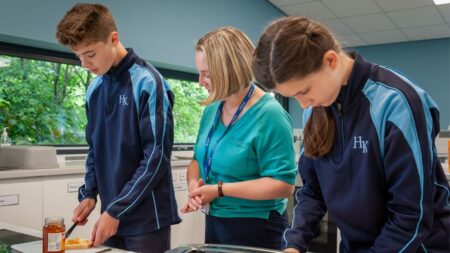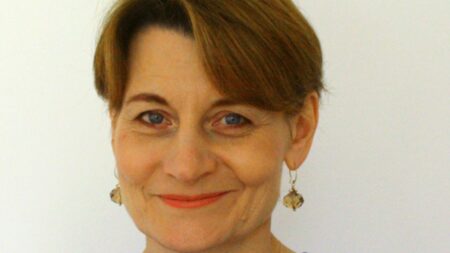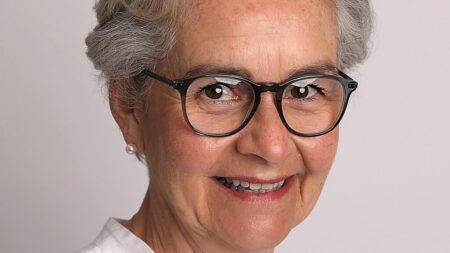Celebrate difference

Heathfield Knoll School
Carolyn Reed and Katie Cardona say special educational needs is a strength in our schools and should be communicated with positivity
“Believe you can and you’re halfway there.” – Theodore Roosevelt.
At the heart of every successful independent school lies a commitment to nurturing every pupil, regardless of ability, background or need.
Data from the Independent Schools Council’s (ISC) latest annual census shows a 78% increase in the number of children with special educational needs (SEN) attending independent schools in the past decade. The number of pupils in ISC schools with additional needs has risen from 66,026 in 2015 to 117,618 in 2025, according to the census. The figures also show a 5.8% year-on-year increase, from 111,154 pupils with SEN support in 2024 to 117,618 in 2025. The reasons for the increasing numbers of SEN pupils are complex – a combination of social, educational, diagnostic and policy-related factors.
Independent schools often benefit from greater flexibility in their curriculum, staffing and intervention strategies. This allows them to provide more individualised support for SEN pupils, including smaller class sizes and a higher ratio of specialist staff. Crucially, they can respond more quickly to emerging needs without the delays often associated with Education, Health and Care Plan assessments or local authority processes. As a result, many independent schools are able to offer bespoke, holistic approaches that help SEN pupils thrive, particularly in cases where mainstream state provision may struggle to meet complex needs.
While the growing demand for SEN provision in the independent sector is sometimes viewed as a challenge, forward-thinking schools recognise it as a strength. SEN is not simply a need to be managed, it is a powerful force that fosters inclusive, compassionate communities, drives innovation in teaching and enriches the educational experience for all learners.
Schools that embrace SEN don’t just accommodate difference, they celebrate it. When children with diverse learning needs are fully included in school life, every pupil benefits. They learn empathy, patience and the essential life skill of seeing the world from another’s perspective.
Teachers, too, grow through SEN. Supporting a wide range of learners encourages creative problem-solving and flexible teaching methods. It sharpens the skills of observation, communication and adaptability – skills that elevate education for every child in the room.
At Heathfield Knoll School in Worcestershire, SEN is not just accommodated, it is embraced as an integral part of a thriving, inclusive school community. Led by head Lawrence Collins, this mixed-ability day school, catering for pupils aged from three months to 19 years, is pioneering a compassionate and forward-thinking approach to SEN education. Central to the school’s ethos is the belief that happiness underpins all meaningful learning and this philosophy drives its commitment to holistic pupil development. Through Connect, its dedicated and purpose-built SEN base, Heathfield Knoll ensures that pupils with additional needs are fully supported while remaining active participants in the broader life of the school. In doing so, the school is setting a powerful example of how inclusive education can be both nurturing and aspirational.
This approach extends to every corner of the community. “We understand the importance of strong, nurturing relationships across the school community,” Collins says. These relationships are based on the acceptance of each other, within a broad, inclusive, nurturing and supportive environment in which all pupils have opportunities for enrichment, challenge and preparation for their futures.”
Collins is clear that he “doesn’t work in a SEN school. I work in a mixed ability mainstream school that, by extension of meeting all needs, includes meeting the needs of children with SEN”.
At Heathfield Knoll School, inclusion isn’t a policy, it’s a philosophy lived daily. The school fosters a deeply supportive, accepting environment that embraces difference and nurtures every learner’s potential.
Shifting the SEN narrative
SEN can be surrounded by misunderstanding, sometimes reduced to labels or isolated approaches. At Heathfield Knoll, that attitude is being challenged.
“Positive messaging around SEN should be less on what’s ‘special’ or different,” Collins explains “and more about embracing and accepting that good practice for SEN children is typically good practice for all children.”
Celebrating neurodiversity
In the corridors and classrooms of Heathfield Knoll, signs of inclusion aren’t just visible, they’re celebrated. In assemblies, pupils with neurodiverse identities share their stories. In the Pupil Parliament, voices from all areas of the school, including Connect pupils, have equal weight.
Even cultural initiatives carry the message. One recent campaign invited pupils to “#BeMorePenguin” as part of Worcester’s city-wide art trail, embracing values like curiosity, friendship, kindness, resilience and perseverance.
Dispelling myths
One of the biggest challenges in SEN education remains public perception. A lot of mental health challenges are invisible but no less real. “Anxiety and stress debilitate children,” Collins explains. “Addressing adolescence mental health demands patience, time and understanding.”
Too often, society still views difference as deficiency. “As a society we too often push away from that which we don’t fully understand. And when we do seek to ‘understand’ there is so much misinformation in circulation that stereotypes are reinforced,” says Collins.
Celebrating progress
“When reflecting on the successes of our SEN pupils, there are many wonderful stories, so highlighting one seems disingenuous” says Collins. At Heathfield Knoll it’s difficult to single out just one story because every journey is unique, filled with its own moments of progress and pride.
However, what unites these stories is a common thread – families who have felt let down or disconnected from the mainstream education system. At Heathfield Knoll, possibly its proudest achievement is rebuilding that trust by offering a provision that truly listens.
For many pupils, particularly those experiencing high levels of anxiety, even attending school can be an overwhelming challenge. By listening to each pupil’s needs, Heathfield Knoll can make thoughtful adjustments, such as providing quiet lunch spaces or using visual timetables, and this makes a significant difference to the pupils’ daily experience.
One remarkable example is a sixth-form pupil who joined in Year 9. At the time, he faced considerable social and emotional barriers. With patient, personalised support and a nurturing environment, he not only thrived academically but also personally. This year, he represented the UK at the Balkan Mathematical Olympiad which is a prestigious achievement in itself. However, what made it truly special was that it also marked his first overnight stay away from home. This milestone reflected both his academic brilliance and emotional growth.
This story highlights what is possible when the focus is on individual strengths, listening without judgment and creating space for each pupil to grow at his or her own pace.
Empowering the individual
This story is also an example of how Heathfield Knoll believes that every pupil should be empowered to explore who they are and what they can achieve. Central to its mission is the commitment to challenge the pupils to find their own pathway by encouraging curiosity, critical thinking and inquisitiveness.
The school fosters an inclusive, no-fear approach to learning where pupils are encouraged to be themselves and to accept others without judgment. Rather than focusing solely on academic benchmarks, every small step forward is celebrated, recognising that progress looks different for every child.
A clear example of this ethos in action is the annual school production. Rather than asking pupils to conform to a single model of performance, the process is adapted to suit individual needs and strengths.
Collins explains: “A part can be split with one pupil doing the singing and another the voice acting; other pupils support the production through working backstage, on the lighting rig or working the sound deck.” Every contribution is valued and every pupil has the opportunity to shine in a way that is meaningful for them.
In this environment, pupils don’t just take part, they find pride in their unique abilities, discover where they belong, and build the confidence to celebrate who they are.
Individual support leads to high aspirations
It’s clear that at Heathfield Knoll, aspiration and inclusion go hand in hand. The SEN-friendly classrooms are calm, organised and visually supportive. They benefit all pupils. “A SEN-friendly classroom is welcoming to all,” Collins affirms. At Heathfield Knoll inclusivity isn’t about dramatic changes. It’s about smart, thoughtful tweaks that open doors.
The school’s approach is one of openness. Its wellbeing hub, The Haven, was moved to a prominent location to signal transparency and integration. For Heathfield Knoll it’s important that its support structures are visible and valued, not tucked away.
Advice for educators
The message to other mainstream schools is clear – inclusion is achievable and it starts with attitude. “A positive approach to SEN is a positive approach to all pupils,” Collins emphasises. “Being inclusive is not necessarily about a ‘special’ approach. This indicates a paradigmatic shift in practice and wide-ranging choices. Instead it involves small, achievable changes to meet the needs of some of our most vulnerable yet rewarding learners”.
Hope for the future
While challenges remain, there’s hope. “There’s greater understanding now than ever before, among policymakers and gatekeepers,” says Collins. “This is leading to change in areas such as curriculum and assessment.”
Progress may be gradual, but it is undeniably under way.
What stands out from the experiences of schools like Heathfield Knoll is a powerful reminder of education’s deeper purpose – not to mould every pupil to the same standard, but to help each individual uncover their strengths and thrive. When schools move beyond simply accommodating difference to actively learning from it, they create communities where inclusion isn’t a policy, it’s part of the culture. And in that shift lies the true promise of SEN provision – a more compassionate and inspiring future for all learners.
Katie Cardona and Carolyn Reed are from Reed Brand Communication, a marketing consultancy specialising in schools and education

Carolyn Reed

Katie Cardona
